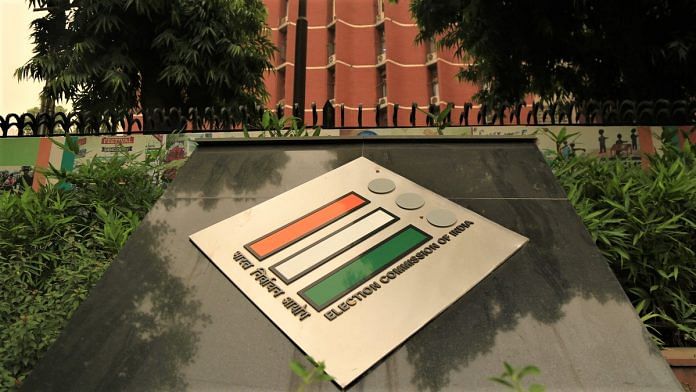To say that in the last five years of the PM Narendra Modi government most independent institutions in India have lost their halo would be stating the obvious. But the one institution that has a lot of explaining to do is the Election Commission. Time and again, the Election Commission has allowed the government to escape without even a cursory rap on the knuckles.
It is often said that once is chance, twice is coincidence and the third time is a pattern. For our national poll regulator, the pattern is too obvious.
The ‘rampage’ of T.N. Seshan
Gone are the days when foreign newspapers would write articles on chief election commissioners like T.N. Seshan referring to him as “India’s scourge of money, muscle and ministers.” Even a few months ago, before the Madhya Pradesh assembly election, the Supreme Court told the Election Commission to retain the credibility it had during Seshan’s days.
T.N. Seshan was the chief election commissioner from 1991-96.
While Seshan could be very unreasonable at times, it didn’t take anything away from his commitment to free and fair elections. Such was his terror that in October 1993, the P.V. Narasimha Rao government decided to turn the Election Commission into a multi-member body, appointing M.S. Gill and G.V.G Krishnamurthy as election commissioners, and restricting Seshan’s powers. Ironically, four years earlier, in October 1989, the Rajiv Gandhi government had appointed S.S. Dhanoa and V.S. Seigell as election commissioners under R.V.S. Peri Shastri, although the appointments were rescinded within months, leading to a legal battle in the Supreme Court. Dhanoa, a former chief secretary of Punjab, incidentally, is the father of current Indian Air Force chief B.S. Dhanoa.
Four years later, when the government got an ordinance promulgated to appoint two election commissioners, it was Seshan’s turn to go to the Supreme Court.
Also read: A birthday tribute for TN Seshan, the only man alongside God whom Indian politicians feared
However, the court sided with the government, but not before citing one important paragraph from the Dhanoa case judgment: “There is no doubt that two heads are better than one, and particularly when an institution like the Election Commission is entrusted with vital functions, and is armed with exclusive uncontrolled powers to execute them, it is both necessary and desirable that the powers are not exercised by one individual, however, all-wise he may be. It ill conforms the tenets of the democratic rule. It is true that the independence of an institution depends upon the persons who main it and not on their number. A single individual may sometimes prove capable of withstanding all the pulls and pressures, which many may not. However, when vast powers are exercised by an institution which is accountable to none, it is politic to entrust its affairs to more hands than one.”
But Seshan was not ready to be tamed. When the government started dragging its feet on issuing photo identity cards to voters, Seshan threatened to use Rule 37 of Representation of Peoples Act to not hold any elections after 1 January 1995. The matter was resolved in court, but photo identity cards soon became a must.
The credit for turning a tooth-less model code of conduct into a virtual rulebook, which had to be strictly followed by the government and opposition alike, also goes to Seshan. Senior police officers and civil servants were transferred even on minor counts of what the Seshan-led Election Commission considered misdemeanours; governors and senior ministers were handed out censures without any second thought, with the public gleefully enjoying the travails of the politicians and officers, who appeared powerless before a rampaging Election Commission.
Also read: Not just BJP, every political party loves a subservient Election Commission
The times they are a changin’
T.N. Seshan’s successors also didn’t restrain themselves, often acting tough against the government of the day just to send out a message that they were committed to levelling the playing field.
Under the UPA-II regime, then chief election commissioner S.Y. Quraishi called law minister Salman Khurshid to Nirvachan Sadan for a meeting on electoral reforms, because an ‘independent’ Election Commission going to Shastri Bhawan, which houses the law ministry, could send out the wrong signal.
Times have changed now.
Under the Narendra Modi regime, the Election Commission appears like an extension of the central government.
The fate of other institutions hasn’t been too good either. The CBI is now a dead, not a caged, parrot. The Central Vigilance Commission (CVC), the Central Information Commission (CIC), the Enforcement Directorate (ED), the Income Tax department are not even pretending to appear independent.
The Supreme Court has also failed on several occasions to stand up to the bullying by the Modi government on issues related to appointments in higher judiciary.
The only institution that has shown some spunk in recent times is the Comptroller and Auditor General (CAG), which many in the opposition had thought would give a clean-chit to the Modi government for its controversial purchase of the Rafale fighter jets. The report was anything but.
Also read: We must save the Election Commission from the clutches of Indian politicians
For every questionable thing that the government’s senior functionaries do, the Election Commission is seen as trying to come up with an explanation to justify not taking any action.
In fact, one may be excused for forming the impression that the Election Commission has acted more against the opposition and opposition-ruled state governments than against the BJP and its allies. Even in various courts, whenever issues related to transparency and electoral reforms have been raised, the response of the Election Commission was often found to be lacking.
Pushing the envelope or sending out a forceful message to the political class, especially those ruling us, is something that one can’t associate with the Election Commission any longer.




One thing the ECI should get right is a much higher percentage of VVPAT verification.